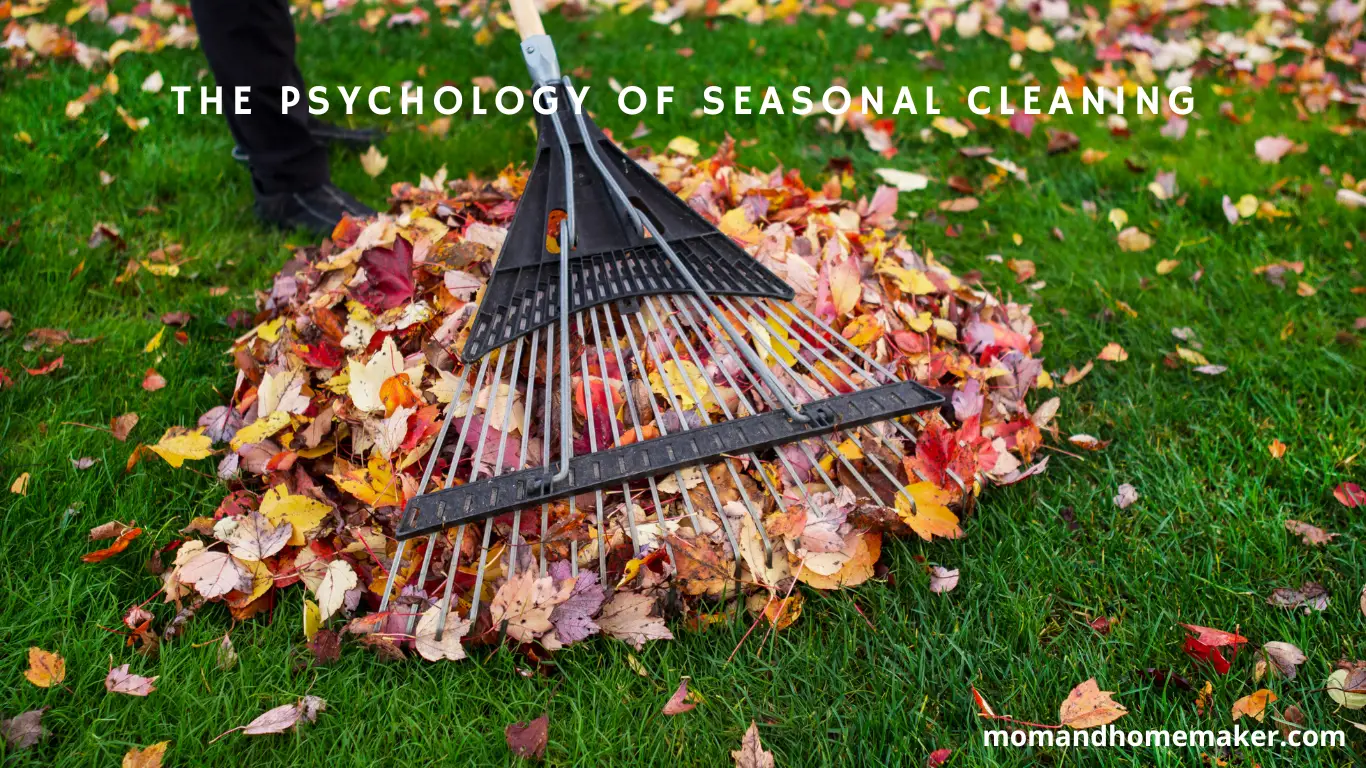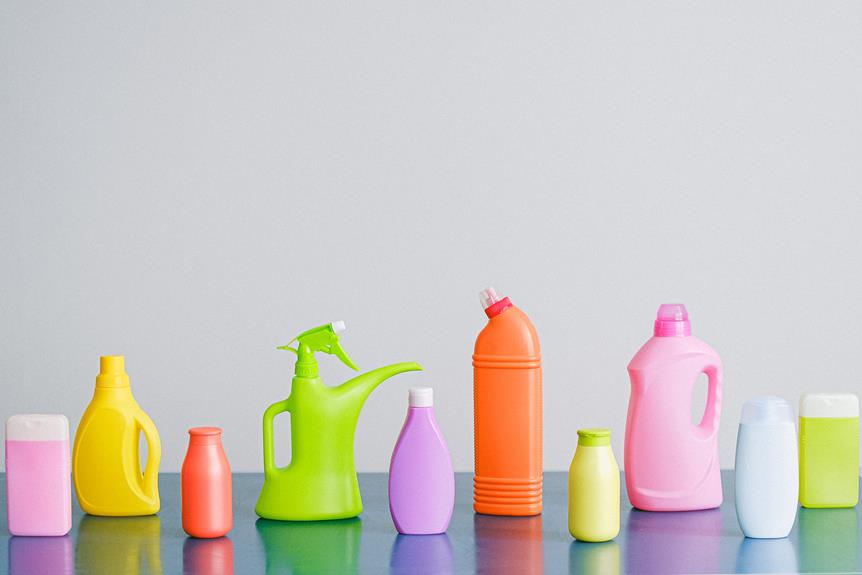The psychology of seasonal cleaning delves into the intricate relationship between human behavior and the changing of seasons.
Whether it’s the rejuvenating energy of spring or the reflective mood of winter, each season brings with it a unique psychological impact that influences our approach to tidying up and organizing our surroundings.
Exploring the underlying motivations and emotional benefits of seasonal cleaning can shed light on the profound connection between our inner world and the external environment.
Spring Cleaning: A Psychological Phenomenon
Spring cleaning is a psychological phenomenon that prompts individuals to tidy up and freshen their living spaces during the change of seasons. People engage in this deep cleaning process to embrace the renewal and rebirth that comes with the arrival of spring.
As the weather warms up, there’s a natural inclination to get rid of the physical and emotional baggage accumulated during the winter months. The changing weather plays a significant role in motivating individuals to declutter and clean their homes.
Deep cleaning during spring offers numerous benefits. It not only provides a fresh start but also gives a sense of accomplishment and satisfaction.
Cleaning becomes a way to express oneself, as individuals have the opportunity to create a space that reflects their style and preferences. Moreover, decluttering can have a positive impact on mental well-being by reducing stress and promoting clarity and organization.
By simplifying language and avoiding overused phrases like ‘renewal and rebirth,’ we can better explain the importance of spring cleaning.
The act of cleaning becomes a form of self-expression, allowing individuals to create a space that truly reflects their style and preferences. Moreover, the process of decluttering can have a positive impact on mental well-being, reducing stress and promoting a sense of clarity and organization.
Instead of using generic transitions like ‘Moreover,’ we can create a natural flow based on context. For example, when discussing the benefits of spring cleaning, we can transition by saying ‘Not only does it allow for a fresh start, but it also creates a sense of accomplishment and satisfaction.’
To provide more specific examples and recommendations, we can suggest using eco-friendly cleaning products or organizing tools that can enhance the spring cleaning experience.
The Link Between Seasonal Changes and Motivation to Clean
Seasonal changes can often inspire a sudden desire to clean and declutter our living space. This phenomenon can be explained by psychology.
When we experience a seasonal transition, such as the start of a new year or the arrival of spring, we feel a sense of renewal and fresh beginnings. This can trigger an internal motivation to tidy up and organize our surroundings, which has a range of cognitive benefits.
One reason why seasonal changes inspire us to clean is due to the field of environmental psychology. Our environment has a significant impact on our mental well-being. By cleaning and decluttering, we create a sense of order and control in our living space. This, in turn, promotes a positive mood and reduces stress.
Seasonal transitions also serve as reminders to evaluate our habits and routines. Cleaning becomes a way to start anew and establish healthier habits. This process of personal growth and accomplishment can contribute to our motivation to clean during seasonal changes.
The desire to clean and declutter during seasonal changes often comes from within. It’s driven by an internal need to create a harmonious and nurturing environment for ourselves and our loved ones. This intrinsic motivation fuels our determination to tidy up and create a more pleasant living space.
Engaging in cleaning and organizing activities also offers cognitive benefits. These tasks require focus and attention to detail, which can improve our cognitive abilities such as decision-making, problem-solving, and memory. By engaging in these activities during seasonal changes, we not only create a cleaner space but also enhance our mental sharpness.
The Influence of Weather on Cleaning Behavior
The weather significantly influences your cleaning behavior during seasonal changes. The impact of weather on cleaning motivation is undeniable. As the days become warmer and longer, you may feel a renewed sense of energy and motivation to tackle household chores. The sunshine streaming through the windows and the fresh scent of blooming flowers can inspire you to deep clean your living space.
Weather conditions can also remind you of the benefits of thorough cleaning. Just like spring brings renewal and rebirth to the natural world, a deep cleaning can provide a fresh start for your home. It removes accumulated dust and clutter, creating a clean and organized environment that promotes a sense of well-being and harmony.
Moreover, the weather can influence your cleaning behavior as a form of self-expression. Just as you might change your wardrobe to reflect the seasons, you may also feel compelled to refresh your living space. This can involve rearranging furniture, adding decorative touches, or simply giving your home a new look. Cleaning becomes a way to express your style and create a space that reflects your identity and values.
To better understand the influence of weather on cleaning behavior, let’s take a look at the following table:
| Weather Condition | Cleaning Behavior |
|---|---|
| Sunny and warm | Motivated to deep clean and declutter |
| Rainy or gloomy | More inclined to stay indoors and clean |
| Snowy or cold | Less motivated to clean, may prioritize indoor activities |
As you can see, the weather has a direct impact on your cleaning motivation and behavior. So, embrace the changing seasons and let the weather inspire you to create a clean and welcoming home that reflects your unique personality and style.
Psychological Benefits of Deep Cleaning
Deep cleaning your living space can have significant psychological benefits that contribute to your overall well-being. When you take the time to deep clean, you’re not just tidying up your physical environment; you’re also engaging in a form of cleaning therapy.
Here are some of the psychological benefits you can experience:
- Motivation for seasonal cleaning: Deep cleaning during different seasons can be motivated by a desire for renewal and a fresh start. It can help you feel more energized and motivated to tackle new challenges.
- Deep cleaning as self-care: Engaging in deep cleaning can give you a sense of control and accomplishment. Taking care of your living space can also be a way of taking care of yourself, promoting feelings of self-worth and self-care.
- Emotional rewards of deep cleaning: Deep cleaning can have emotional rewards, such as reducing stress and anxiety. A clean and organized living space can create a sense of calm and serenity, allowing you to feel more at ease and relaxed.
- Deep cleaning and mental well-being: There’s a strong connection between deep cleaning and mental well-being. By creating an organized and clean environment, you can improve your mental clarity, focus, and overall happiness.
The Role of Renewal and Rebirth in Seasonal Cleaning
Engaging in seasonal cleaning not only provides psychological benefits but also promotes renewal and rebirth in your living space. When you take the time to deep clean and declutter your home, you create an environment that fosters growth and rejuvenation. By clearing out the old and making space for the new, you allow fresh energy and positive vibes to flow through your living space.
Completing a thorough cleaning can be incredibly satisfying. As you scrub away dirt, organize your belongings, and create a clean and inviting space, you feel a sense of pride and achievement. This boosts your self-esteem and enhances your overall well-being.
Seasonal cleaning also offers valuable stress relief. Engaging in the physical activity of cleaning allows you to release tension and pent-up energy. The repetitive motions and focus required in cleaning can serve as a mindfulness practice, helping you find a sense of calm and tranquility in the present moment.
In addition to the personal benefits, seasonal cleaning has a positive environmental impact. By decluttering and organizing your belongings, you can reduce waste and make more conscious choices about what you truly need and value. This mindful approach to cleaning helps you develop a deeper connection with your surroundings and a greater appreciation for your living space.
Seasonal Cleaning as a Form of Self-Expression
Seasonal cleaning is a way for you to express yourself through the organization and arrangement of your living space. It’s not just about tidying up and getting rid of clutter; it’s an opportunity for self-care, creativity, mindfulness, emotional release, and self-discovery. Let’s explore how seasonal cleaning can be a form of self-expression.
First and foremost, seasonal cleaning is an act of self-care. By taking the time to clean your living space, you prioritize your well-being and show yourself some love. Creating a clean and comfortable environment promotes relaxation and rejuvenation, allowing you to recharge and take care of yourself.
In addition to self-care, seasonal cleaning also offers a chance to unleash your creativity. You can experiment with different cleaning techniques, find unique storage solutions, or even rearrange your furniture to create a fresh new look in your home. Let your imagination run wild and see how you can transform your space into a reflection of your personal style and preferences.
Engaging in cleaning tasks mindfully can bring a sense of calm and help you stay present in the moment. Take the time to pay attention to the sensations, smells, and sounds as you clean. By fully experiencing the process, you can cultivate mindfulness and find solace in the simple act of cleaning.
Cleaning can also serve as a cathartic release for pent-up emotions. As you clean, you have the opportunity to let go of negative energy and create space for positivity and growth. It’s a chance to clear out both physical and emotional clutter, leaving you with a renewed sense of lightness and freedom.
Furthermore, cleaning can provide a chance for self-reflection and self-discovery. As you sort through your belongings, you may uncover forgotten treasures, rediscover lost memories, and gain insights into your preferences and values. It’s a journey of self-exploration, allowing you to better understand yourself and what brings you joy.
Incorporating seasonal cleaning into your routine can be empowering and fulfilling. It not only enhances the physical aspects of your living space but also allows you to express yourself and create a harmonious environment that reflects your unique personality and desires. Your living space will thank you, and you’ll discover a deeper connection to yourself along the way.
The Psychological Impact of Clutter on Our Well-Being
Clutter can significantly impact your psychological well-being. Living in a cluttered environment can affect your cognitive abilities and emotional state. Studies have shown that clutter can lead to decreased focus, impaired decision-making, and reduced productivity. When surrounded by clutter, your brain has to work harder to process information, leading to mental fatigue and decreased mental clarity.
Emotional well-being is also affected by clutter. Living in a cluttered space can cause feelings of stress, anxiety, and overwhelm. It can be challenging to relax and unwind when your surroundings are chaotic and disorganized. On the other hand, decluttering and organizing can have a positive impact on your emotional well-being. Creating a clean and organized space can promote a sense of calm and tranquility.
By reducing clutter, you can also reduce stress. Clutter has been linked to increased cortisol levels, the hormone associated with stress. By decluttering and creating a more organized space, you can create a sense of order and control in your life, leading to a reduction in stress levels.
Moreover, decluttering can provide a sense of accomplishment. Clearing out the clutter and organizing your space can give you a feeling of satisfaction and pride. It can boost your self-esteem and motivate you to tackle other tasks in your life.
The Connection Between Seasonal Cleaning and Mental Health
Maintaining a clean and organized living space can have a positive impact on your mental health. Seasonal cleaning not only helps create a tidy environment, but it also has a profound connection to your overall well-being. Here’s how it can benefit your mental health:
Cleaning promotes mindfulness: Engaging in cleaning activities allows you to focus on the present moment and the task at hand. It helps you become fully aware of your surroundings, leading to a sense of calm and clarity.
Reduced stress levels: A cluttered and messy living space can contribute to increased stress. However, decluttering and organizing your space can create a sense of order and control, reducing stress and promoting relaxation.
Psychological benefits: A clean and organized environment improves concentration and productivity. It provides a sense of calm and tranquility, enabling you to better focus on tasks and enhance your overall mood.
Improved mood: Research suggests that there’s a strong correlation between a clean living space and a positive mood. A clean environment can uplift your spirits, decrease feelings of anxiety and depression, and foster a sense of well-being.
The Symbolic Meaning of Cleaning Rituals
Cleaning rituals hold deep symbolic meaning and significance beyond simply maintaining a tidy living space. These traditions are rooted in cultural practices around the world, each infused with unique gestures that carry psychological importance. By exploring two different cultural practices, we can better understand the symbolism behind cleaning rituals.
In Japan, the tradition of ‘osouji’ involves spring cleaning to purify the home and prepare for the new year. People meticulously clean every corner, removing physical and spiritual impurities. This act symbolizes the renewal of the soul and the welcoming of positive energy.
On the other hand, in Mexico, the tradition of ‘limpia’ involves using herbs like sage or copal to cleanse the home of negative energies. A spiritual healer called a ‘curandero’ performs the ritual, sweeping away negative influences and restoring balance and harmony. This act symbolizes the removal of obstacles and the invitation to good luck and prosperity.
These examples highlight the rich symbolism and psychological significance embedded in cleaning rituals. By engaging in these traditions, individuals feel a sense of connection to their cultural heritage and belonging to something greater than themselves. Moreover, these symbolic gestures provide a sense of purpose and meaning, promoting overall well-being and contentment.
The Role of Social Comparison in Seasonal Cleaning
When it comes to seasonal cleaning, social comparison plays a significant role in shaping our cleaning habits. Social comparison refers to how we evaluate ourselves about others. Let’s explore how social comparison influences our motivation to clean during different seasons.
One way social comparison affects our seasonal cleaning is by serving as a motivator. When we see our friends or neighbors engaging in cleaning activities, it can inspire us to start our cleaning projects. Witnessing others deep-clean their homes encourages us to experience the benefits of a refreshed living space.
The influence of weather on our cleaning motivation is also tied to social comparison. As the season changes and people around us embrace the idea of renewal and rebirth, we may feel compelled to join in and participate in the cleaning rituals. Seeing others embrace the season’s cleaning rituals motivates us to do the same.
Engaging in deep cleaning not only benefits our physical space but also our mental well-being. When we compare our cleaning progress to others, it creates a sense of accomplishment and satisfaction. This sense of achievement further motivates us to continue our cleaning endeavors.
Furthermore, social comparison fosters a sense of belonging. By participating in seasonal cleaning rituals, we become part of a shared experience and feel connected to others who are also engaged in this practice. This sense of belonging can enhance our motivation to clean and make the process more enjoyable.
The Psychological Satisfaction of Decluttering and Purging
Decluttering and purging can bring you a deep sense of satisfaction that goes beyond simply cleaning up your physical space. It has a profound impact on your mental and emotional well-being. Let’s explore why decluttering and purging can provide such satisfaction.
One reason is that clearing out clutter can be an emotional release. It allows you to let go of the past and create space for new experiences and opportunities. This process can be cathartic and liberating, bringing a sense of lightness and freedom.
Completing the task of decluttering and purging also gives you a sense of accomplishment and achievement. It provides tangible evidence of your progress and productivity, boosting your self-esteem and confidence.
Clutter can contribute to feelings of overwhelm and stress. By removing unnecessary items and organizing your space, you create a calmer environment that promotes relaxation and reduces anxiety.
A clutter-free space allows you to focus better on the task at hand. With fewer distractions, your mind can concentrate more effectively, leading to increased productivity and efficiency.
Clearing out physical clutter can have a direct impact on your mental clarity. It helps declutter your mind, allowing you to think more clearly and make better decisions.
The Relationship Between Seasonal Cleaning and Productivity
To increase your productivity, it’s important to incorporate seasonal cleaning into your routine. Seasonal cleaning and effective time management go hand in hand. When you take the time to clean and organize your space, it creates a more efficient environment.
This allows you to easily find things, saving you time and reducing distractions. A clean environment has a psychological impact that shouldn’t be underestimated. A clutter-free space promotes clarity of mind and helps you stay focused on your tasks.
Seasonal cleaning also plays a crucial role in reducing stress. A messy and disorganized space can create feelings of overwhelm and anxiety. By regularly decluttering and tidying up, you create a calm and peaceful atmosphere that promotes relaxation and reduces stress levels.
Furthermore, there’s a strong connection between seasonal cleaning and goal setting. When you clean and organize your space, you’re setting the stage for success. A clean and organized environment provides the foundation for setting and achieving goals. It helps you stay motivated and focused on what needs to be done.
Lastly, seasonal cleaning promotes mindfulness. When you engage in the cleaning process, you’re fully present in the moment, paying attention to the task at hand. This practice of mindfulness can help reduce stress, improve concentration, and enhance overall well-being.
The Emotional Resonance of Creating Order From Chaos
Incorporating seasonal cleaning into your routine not only boosts productivity, but also taps into the satisfying feeling of creating order from chaos. There’s something truly gratifying about transforming a messy space into an organized and tidy one. This process not only gives you a clean environment, but it also offers therapeutic benefits for your emotional well-being.
When you engage in seasonal cleaning, you experience a unique form of stress relief. As you declutter and reorganize your surroundings, you actively release tension and negative energy. The act of cleaning becomes a mindfulness practice, allowing you to focus on the present moment and let go of any worries or anxieties.
Seasonal cleaning not only provides emotional satisfaction and stress relief, but it also gives you a sense of accomplishment. As you tackle each task and see the progress you’re making, you feel proud of your efforts. This feeling of achievement can boost your self-esteem and motivate you to continue creating order in other areas of your life.
The Psychological Need for Control and Organization
Take control of your surroundings and experience a sense of organization and order through seasonal cleaning. Humans have an inherent need for control and organization. When our environment is cluttered and chaotic, it can lead to feelings of anxiety and stress. However, engaging in seasonal cleaning allows us to regain control and alleviate these negative emotions.
Here are four reasons why the psychological need for control and organization is important:
- Control and anxiety: Cleaning and organizing our space gives us a sense of control over our surroundings, reducing feelings of anxiety and overwhelm.
- Organization and productivity: A clean and organized environment enables us to be more productive and focused. We can easily find what we need and eliminate distractions.
- Sense of accomplishment: Completing a thorough cleaning session gives us a sense of achievement, boosting our self-esteem and confidence.
- Stress reduction: A clutter-free space promotes relaxation and reduces stress. When everything has its place, we can unwind and recharge more effectively.
The Influence of Cultural and Social Factors on Seasonal Cleaning Patterns
Cultural and social factors have a significant impact on how people approach seasonal cleaning. These influences and norms not only determine the cleaning rituals individuals follow but also the frequency and intensity of their cleaning efforts. Let’s explore the different ways cultural and social factors shape seasonal cleaning patterns.
Cultural influences play a crucial role in shaping cleaning traditions. Beliefs and values that are passed down through generations can influence the specific cleaning tasks performed during certain seasons.
For example, some cultures may have special cleaning ceremonies or practices associated with important religious or cultural events. Religious or spiritual beliefs can also dictate the timing of cleaning, such as cleaning before or after specific religious observances.
Social norms within a community also contribute to seasonal cleaning patterns. Expectations of cleanliness can create pressure to conform to societal standards. Peer influence and the desire for social comparison can also motivate individuals to clean.
For instance, if everyone in a community participates in seasonal cleaning, it can create a sense of collective responsibility for cleanliness and encourage individuals to join in.
Historical and geographical factors can also influence cleaning practices. Cultural or historical events may inspire specific cleaning rituals, such as deep cleaning before a historical celebration. Moreover, media and advertising can shape cleaning patterns by promoting specific products or practices associated with seasonal cleaning.
Ethnic and regional differences can further impact seasonal cleaning. Different cultures and regions may have unique cleaning traditions and approaches. In some communities, cleaning is seen as a communal activity, bringing people together to maintain a clean and orderly living environment.
Understanding these cultural and social factors is essential for individuals to feel connected to their community and uphold social norms. While the motivation to clean can stem from the desire for a clean living environment, it’s also driven by the need to adhere to cultural practices and societal expectations.
Conclusion
When you clean your space, you’re not just tidying up – you’re also taking care of your mind. Seasonal cleaning goes beyond being a chore; it’s a psychological phenomenon that brings a sense of renewal and control.
Just like flowers blooming after a long winter, clearing clutter and creating order from chaos can have a transformative effect on our well-being.

















